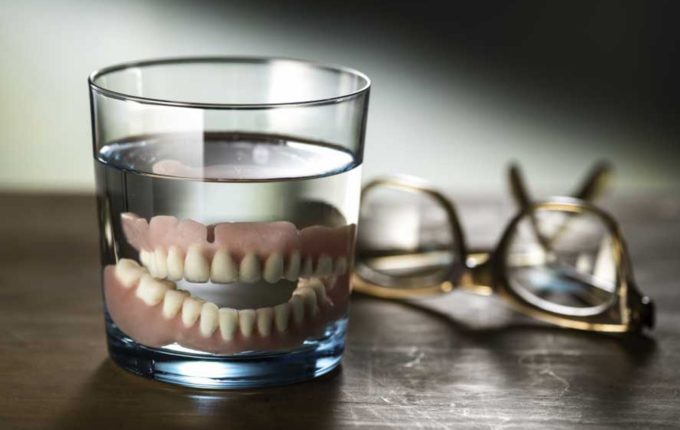Best Tooth Replacement Options For Missing Teeth

In the U.S., less than half of all adults have all of their permanent teeth. As people age, the chance they may be missing at least one tooth increases. More than one in three adults 65 and older have lost at least six teeth and around 17% of adults over 65 are edentulous, meaning they are missing all their natural teeth. Among the most common reasons for tooth loss in adults is untreated dental cavities or tooth decay.
If you live in New York City, you can receive tooth replacement from 209 NYC Dental. Our compassionate team of dentists and assistants recognizes that losing teeth in adulthood is a common occurrence. We invite you to visit our office when you need tooth replacement.
At 209 NYC Dental, our goal is to help you live a healthy, comfortable life through excellent dental care. We offer a wide range of tooth replacement options that will restore your sparkling smile and ensure you can enjoy the food you love to eat.
To learn more about your options for missing teeth or to schedule an appointment with 209 NYC Dental, please Call us today!
Replacement Options for Missing Teeth
There are various reasons why you may lose a tooth during adulthood. Regardless of the cause, replacing a tooth after losing it is important.
Lost teeth cause immediate problems like difficulty chewing and altered speech. Some problems take longer to develop but are more troublesome. Losing a tooth releases some of the pressure that keeps your other teeth in place. Some teeth may shift when given room, causing a crooked smile. Additionally, a lost tooth exposes your gums to bacteria, opening up the potential for an infection and jaw deterioration.
Replacing missing teeth can mitigate all of these immediate and long-term issues while helping you feel more comfortable and confident in the process.
There are several replacement tooth options for adults. The procedure you choose will depend on whether you need a single tooth replacement or treatment for multiple missing teeth.
Six common ways to replace missing teeth are:
- Dental implants
- Implant crown and bridges
- Implant-supported dentures
- Partial dentures
- Complete dentures
- Do nothing
We will review each option, including its benefits and disadvantages, to determine who is the best candidate for each tooth replacement type.
1. Dental Implant
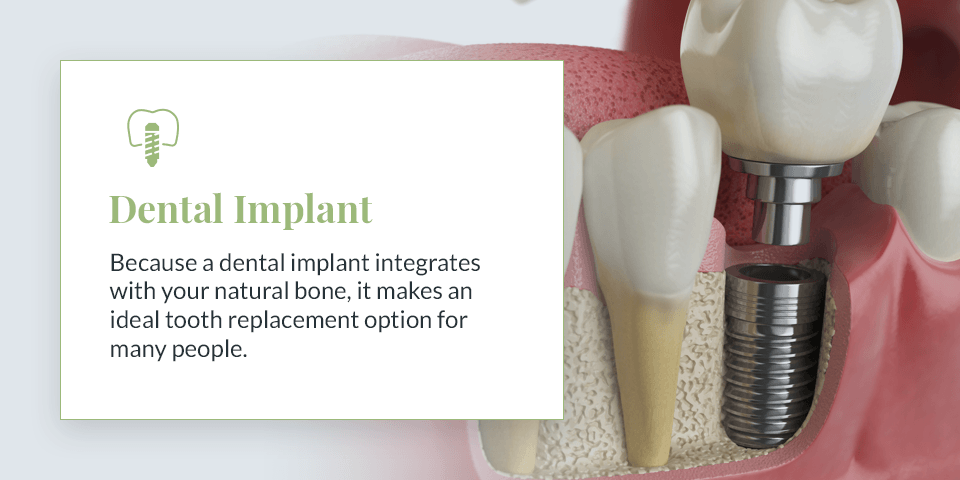
A dental implant integrates with your natural bone, making it an ideal tooth replacement option for many people. Our dentist places an implant securely during the procedure, replacing a natural tooth root. The implant ultimately supports a replacement with a dental bridge, crown or denture.
Dental implants can replace multiple teeth at once. You can also receive a single-tooth dental implant for one missing tooth.
Implants are made from titanium, a biocompatible material used in many kinds of prosthetics, such as artificial joints. Titanium is a strong foundation for your replacement tooth that will lower the chance of losing it. Once the implant is securely placed in the jaw and fully healed, a prosthetic tooth is attached.
Implants could be your best option if you are missing one or more of your teeth due to periodontal disease, injury or other dental health issues.
The Pros and Cons of Dental Implants
Some benefits of implants include:
- They have a 95% treatment success rate.
- They are permanent and durable.
- They feel more comfortable and natural than other options.
- They provide an appealing aesthetic.
- They require minimal maintenance other than professional cleanings, dental checkups and good oral hygiene.
- They are the best tooth-replacement option to prevent jawbone loss.
- They have a long life span, making them the most cost-effective in the long term.
- They do not require any modification of the adjacent teeth.
- They can be done in one day, in some cases, through an immediate implant placement procedure.
Factors to Consider
As a patient, you should also be aware of these important points before receiving implants:
- We require a careful health screening: Because the placement of dental implants is a minor surgical procedure, it requires a thorough medical history. Some patients are unable to be viable candidates for this procedure.
- This procedure has a recovery period: Minor modifications to your activity level may be required 24 hours to 48 hours following surgery. Any strenuous physical activity, like going to the gym, should be avoided for the next two days.
- A dental implant is the first step: A dental implant on its own is not a replacement option but a supporting structure for an implant crown, implant bridge or implant denture.
As with any other dental treatment to replace missing teeth, dental implants are a costly procedure. If you are worried about dental implants’ cost, you can always discuss a payment plan or other financing options with your dentist.
Best Candidates for Dental Implants
Depending on your bone health, you may be able to have your dental implants placed the same day as your tooth extraction — referred to as immediate implant placement. Upon your initial consultation, the dentist will decide if implants are a good replacement option for missing teeth, and if you are a good candidate for immediate implant placement.
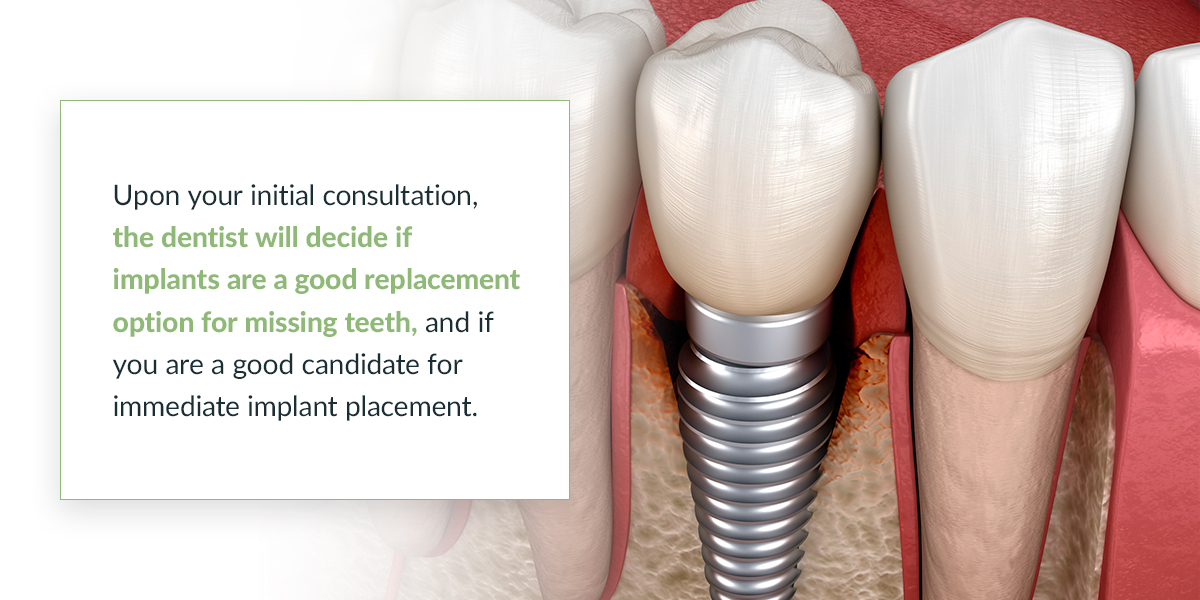
If you are not a candidate for same-day implants, you will require delayed implant placement. You might need delayed implant placement because of an increased risk of infection in your bone, potential issues with your bone’s ability to heal or the need for a bone graft because of inadequate bony tissue. The healing process typically takes two months.
Another factor to consider is whether you need multiple teeth replacement or treatment for a single tooth. If you need to replace multiple teeth, the healing period could take longer than it would for a single tooth. Generally, if you are a good candidate for a single tooth dental implant, you can also have multiple implants installed.
2. Implant Crowns and Bridges
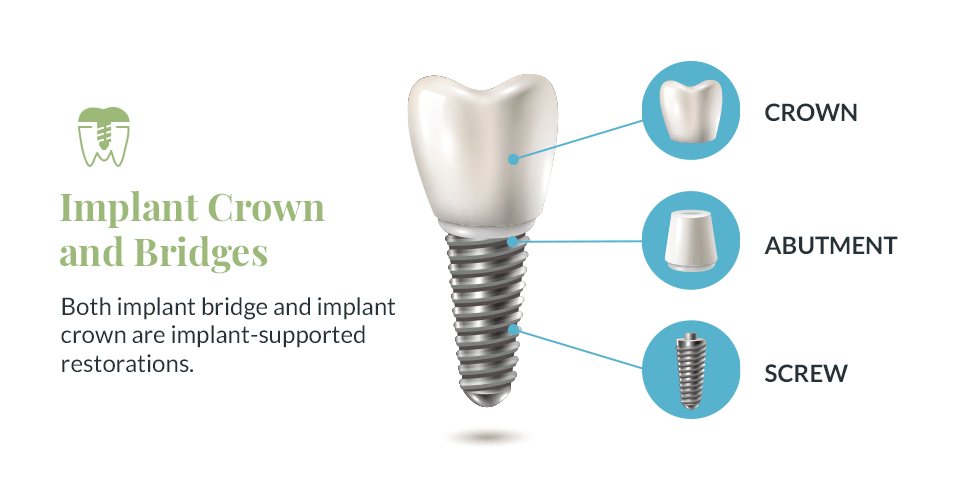
In the past, the only missing back teeth solutions were removable dentures or a dental bridge. Today, you have numerous options. A few good alternatives to the standard restorations are:
- Implant crowns: Artificial caps that replace the visible parts of the teeth you lost if the root remains intact.
- Implant bridges: Two or more dental crowns that form a bridge across two support bases screwed into the jaw.
- Implant-supported dentures: A permanent appliance anchored into the jaw to replace multiple teeth simultaneously.
Both implant bridges and implant crowns are implant-supported restorations. The dentist uses them to replace extracted or missing teeth. An implant crown is the best option to replace one missing tooth in either the front or back.
An implant-supported bridge is an excellent choice to replace a span of several missing teeth — anywhere from three to 12. The number of implants and the length of the implant-supported bridge depends on the number of missing teeth. If you have no teeth, the dentist can perform a full mouth reconstruction with implant-supported dentures or dental implant bridges.
Pros and Cons of Implant Crowns and Bridges
The advantages of implant bridges and crowns include:
- The dentist will not need to grind any of your healthy teeth down to create a new bridge to replace your missing tooth.
- They function like natural teeth, allowing you to eat with confidence.
- They provide aesthetically pleasing results.
- They look and feel natural, making speaking and smiling easy.
- They are easy to maintain — you brush and floss like you would a regular tooth.
- They will last a long time before you will need to replace them.
The primary drawback of implant crowns and bridges is the number of dental visits required. The number of times you need to go to the dentist to replace your tooth or teeth with an implant crown or bridge will vary based on your mouth health and the exact treatment you choose. You can expect the total treatment length to be from three months to six months.
Best Candidates for Implant Crowns
This procedure is best for patients who have primarily healthy teeth. It is less ideal as a procedure for patients who are missing multiple teeth. If you need a bridge for a single missing tooth, the condition of the surrounding teeth must be good enough for the supporting crowns, which will hold the bridge in place.
The best candidates for implant crowns:
- Are looking for stable and strong non-removable teeth.
- Are missing one to a few teeth.
- Are looking for attractive aesthetics, great function, improved speech and confidence.
3. Implant-Supported Dentures
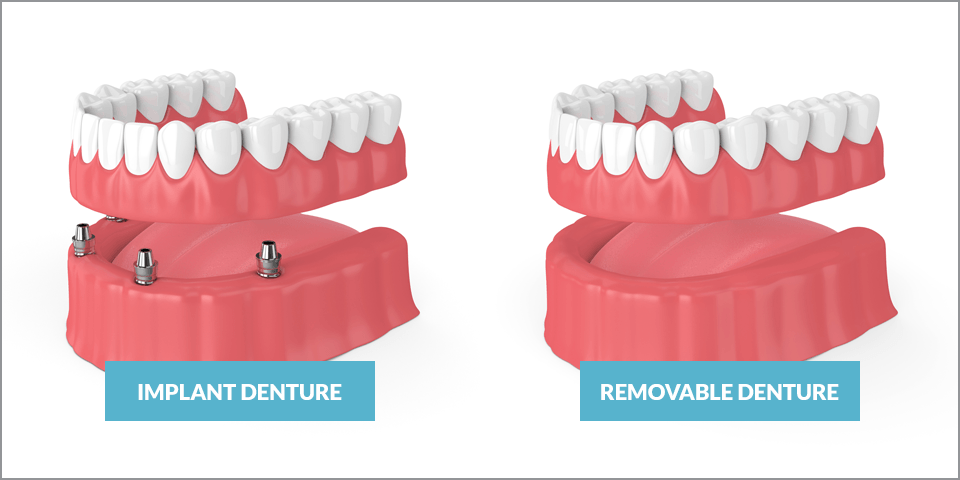
Implant-supported dentures are overdentures attached to and supported by implants. Unlike regular dentures, which rest on your gums, implant dentures attach to implants, providing better support. Implant-supported dentures have many names:
- Implant dentures
- Implant-supported dentures
- Denture implants
- Full denture implants
- Snap-in dentures
However, they all mean the same thing — your implants provide complete denture support.
Like other types of implant-supported restorations, implant denture installation requires two phases. First, an implant specialist performs a surgical procedure to place at least two dental implants into your jaw to hold the dentures. Next, a prosthetic dentist fits your new custom prosthesis.
Types of Implant Dentures
Two types of implant dentures are available:
- Implant- and abutment-supported removable dentures.
- Implant- and abutment-supported fixed denture, also known as a hybrid fixed dentures.
Implant-Supported Removable Dentures
This type of denture is a good option for patients who are missing multiple teeth and want to limit the number of implant installations. Removable dentures help cover your remaining missing teeth, so you will look as if you have a complete set of perfectly straight teeth. Your implants are the anchor points for the dentures and will remain intact when you take the appliance out to sleep.
As with traditional dentures, you have to remove implant-supported removable dentures before going to bed. You also need to clean your gums and dentures daily.
Two types of implant-supported removable dentures are available:
- Ball-retained
- Bar-retained
In either case, our dentist creates your denture out of an acrylic base, which looks like your gums. The dentist then attaches natural-looking acrylic or porcelain teeth to the base. Both of these will need support from a minimum of two implants.
Other types of implant-supported removable dentures include:
- All-on-four, meaning four dental implants support your full denture.
- All-on-eight dentures
Implant-Supported Fixed Dentures
Unlike removable implant dentures, fixed implant dentures are permanently attached to the implants and can remain in the mouth at all times. Maintaining oral health remains critical to ensure the longevity of the implants. Using a water flosser and specially designed floss helps patients achieve the best oral hygiene possible with implant-supported fixed dentures.
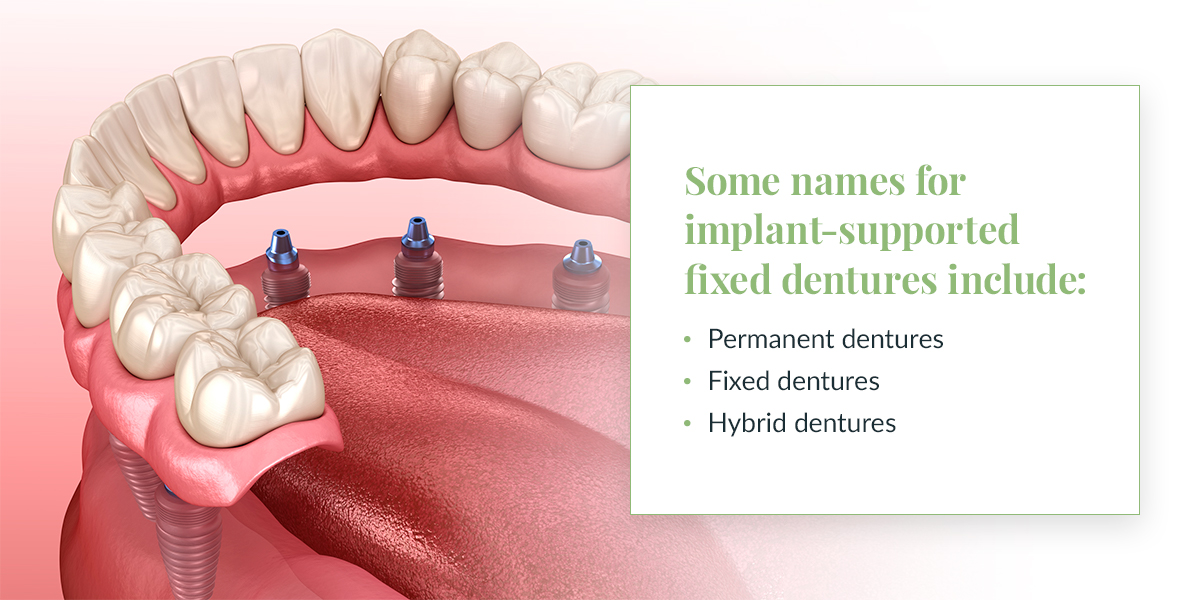
Some names for implant-supported fixed dentures include:
- Permanent dentures
- Fixed dentures
- Hybrid dentures
Removable Implant Denture vs. Fixed Implant Dentures vs. Implant Bridges
How can you choose the replacement option for missing teeth that is best for you? Consider the following factors:
- Your bone health: If there is enough bone, any of the three options to replace missing teeth could work. If you have severe bone loss, meaning there is not enough bone, either fixed or removable implant dentures are an excellent option. Implant dentures allow our dentist to replicate bone by building it out with acrylic. The patient will get an instant facelift with this restoration, as shown in the photos below. A similar result is harder to achieve with an implant bridge.
- Your budget: It’s essential to consider the treatment’s cost before deciding on an option. Removable implant dentures are the least expensive option, as they require as little as two to four implants. Fixed implant dentures or implant bridges require a minimum of six implants, depending on your bone health, which increases the cost.
- Aesthetics: Implant bridges look the most like natural teeth, and many patients find them a comfortable replacement option. Dentures are also designed to look natural, and most people will be unable to tell the difference.
- Maintenance: It’s crucial to maintain your dentures. When brushing fixed implant dentures, you need to use extra care, particularly when cleaning between the non-removable denture and the attachments. It is easier to maintain good oral hygiene with removable implant dentures, but you need to remove them before sleeping.

Best Candidates for Implant-Supported Dentures
The best candidates for this type of denture have multiple missing teeth but want to limit their number of implanted teeth. For full implant-supported dentures, you will only need about four or five implants, which connect to your denture appliances and hold them in place. A good candidate for this treatment option:
- Is in good enough health to undergo the implant procedure.
- Requires the replacement of multiple teeth.
4. Partial Dentures
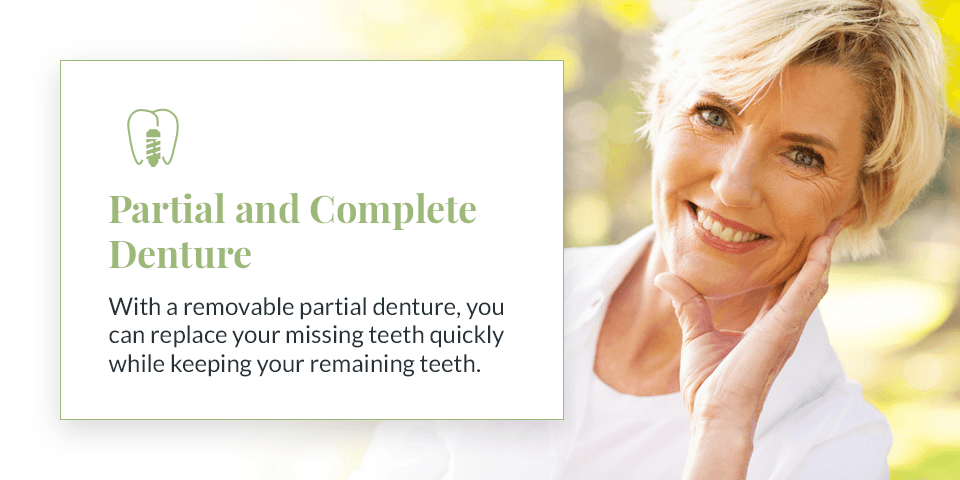
Missing teeth can cause embarrassment. A partial denture can put a smile back on your face fast so that you can feel like your confident self at work and around your family.
With a removable partial denture, you can replace your missing teeth quickly while keeping your remaining teeth. The denture is custom-made based on a mold of your mouth. It is fabricated out of pink acrylic or nylon, which mimics your gums and supports and stabilizes the denture.
The replacement teeth attach to the base and fit into the space of the missing teeth in your mouth. A partial denture might require clasps to keep it in place. Depending on the denture type or the missing teeth’s position, the clasps may be noticeable when you smile or speak.
Benefits of a Partial Denture
Some benefits of partial dentures include:
- They do not cost as much as implants or fixed bridges.
- They restore your smile since they fill in the gaps between your teeth.
- The procedure is relatively quick and non-invasive.
- Depending on the missing teeth’s position and the amount of healthy bone, partial dentures may help improve your ability to eat and speak.
- The dentist might be able to add additional teeth, depending on the type of denture you choose. Please clarify this with your dentist before committing to the treatment. For example, teeth cannot be added to a flexible partial denture.
Disadvantages of a Partial Denture
Some of the disadvantages include:
- They do not always function well or look as natural as fixed options.
- They may require multiple adjustments by the dentist until they fit comfortably.
- They may be slightly obtrusive.
- Use of adhesive creams may be required to ensure a better fit.
- They need to be relined or replaced more often.
- You have to remove them each day to clean them and leave them out during the night so your gums can recover.
- It is easy to misplace or lose a partial denture.
- They can break if dropped.
- Your sense of taste may be lost slightly due to a covered palate.
5. Complete Dentures
Unlike partial dentures that replace only some teeth, complete dentures, also known as full upper or full lower dentures, replace a full arch of missing teeth. You can get complete dentures for your top teeth, bottom teeth or both.
Complete dentures comprise two parts — artificial teeth and a denture base. The artificial teeth will allow you to chew and articulate words like your natural teeth do. The base holds the artificial teeth and connects them to your gums.
Because they do not feature the same jaw implants as options like partial dentures, implants, crowns and bridges, complete dentures are removable. You should remove them each night before bed and store them in a container with a liquid cleanser.
This treatment is ideal for patients who need a replacement for multiple missing teeth but want to avoid getting tooth implants. Complete dentures cover your entire row of missing teeth.
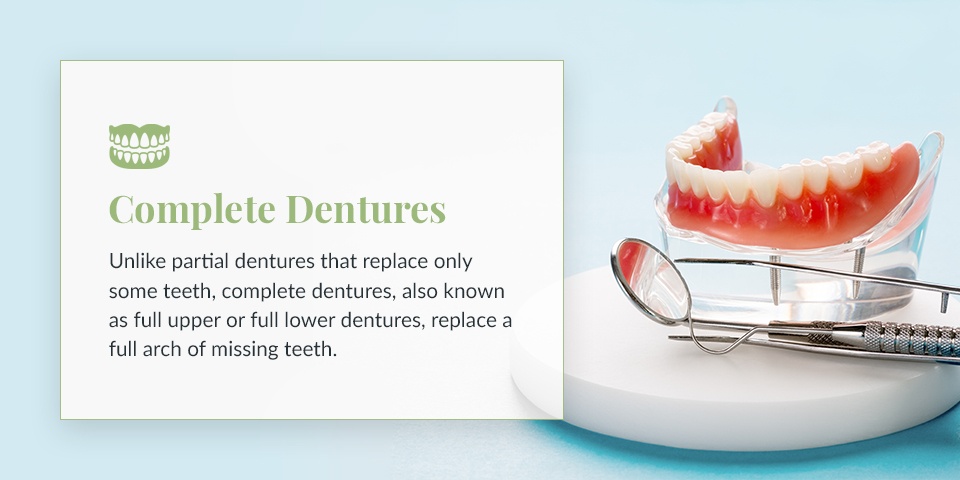
The Pros and Cons of Complete Dentures
Some advantages of complete dentures include:
- Since they replace decayed and missing teeth, they significantly improve your appearance and may boost your self-confidence.
- They provide adequate lip and cheek muscle support, restore facial dimensions and create a younger appearance.
- Like with partial dentures, depending on the health and volume of your bone, complete dentures may help make eating more comfortable and improve your speech.
- They are a relatively fast and affordable treatment option.
- They come in a variety of colors, shapes and sizes, look natural and can match your natural gums closely.
- The dentist can adjust or reline them easily to accommodate the changing shape of your jawbone.
Some disadvantages include:
- They may become ill-fitting due to a change in your jawbone shape.
- You have to remove them to clean them and keep them out overnight to let your gums recover.
- They often require several adjustments to make them comfortable.
- You may require adhesives to keep them in your mouth.
- They may break if dropped.
Best Candidates for Complete Dentures
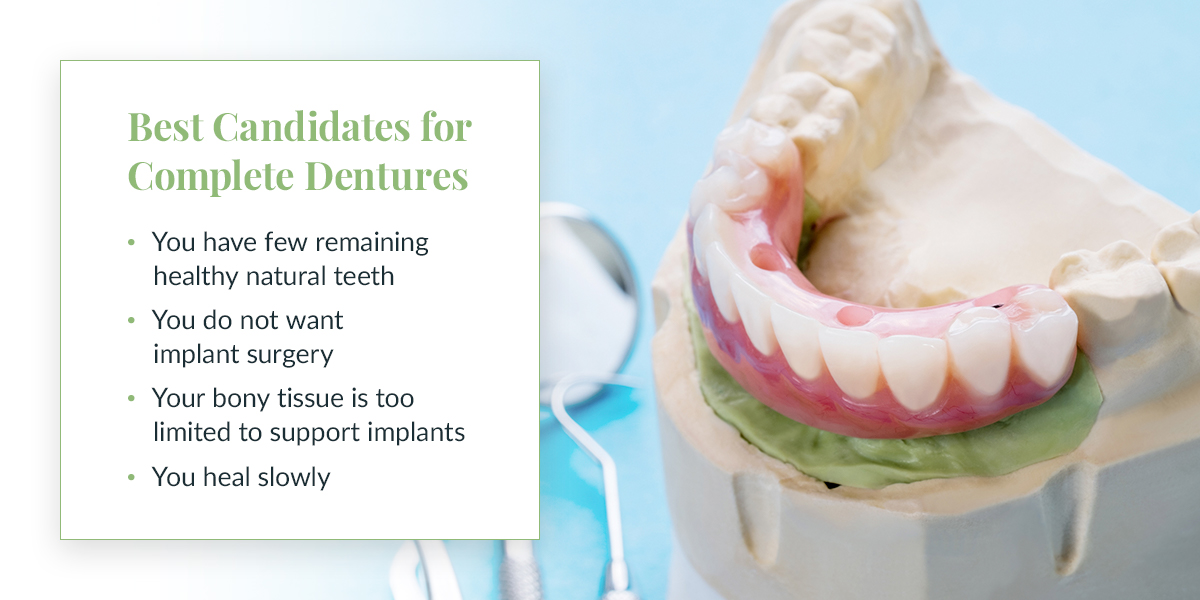
Complete dentures are a low-cost option when you need to replace a complete arch of teeth. They are suitable if:
- You have few remaining healthy natural teeth: This procedure is ideal when you are missing the majority of your teeth.
- You do not want implant surgery: Some patients prefer to avoid having this procedure even when they are viable candidates.
- Your bony tissue is too limited to support implants: Complete dentures are ideal for those with little bone available who want to avoid a bone graft.
- You heal slowly: If you have a medical condition that might make you a poor candidate for implants. Your dentist will let you know if complete dentures are the best option.
6. Do Nothing
Some people choose to do nothing when they have tooth loss that is not visible when smiling or in the back of the mouth. The cost of replacing missing teeth can also cause a person to avoid treatment. However, not replacing missing teeth can cause dental problems down the road.

Why Doing Nothing Is Not an Advisable Course of Action
If you can help it, dental professionals advise against avoiding or delaying care when you have missing teeth. Missing teeth can cause you to lose bone strength in your mouth, and the remaining teeth can shift. Your teeth’s alignment is based on counteraction, meaning teeth help hold each other in place. If there is not a tooth below it, a top tooth may start shifting down. Also, teeth next to empty space will start shifting, creating gaps between teeth and affecting bone health.
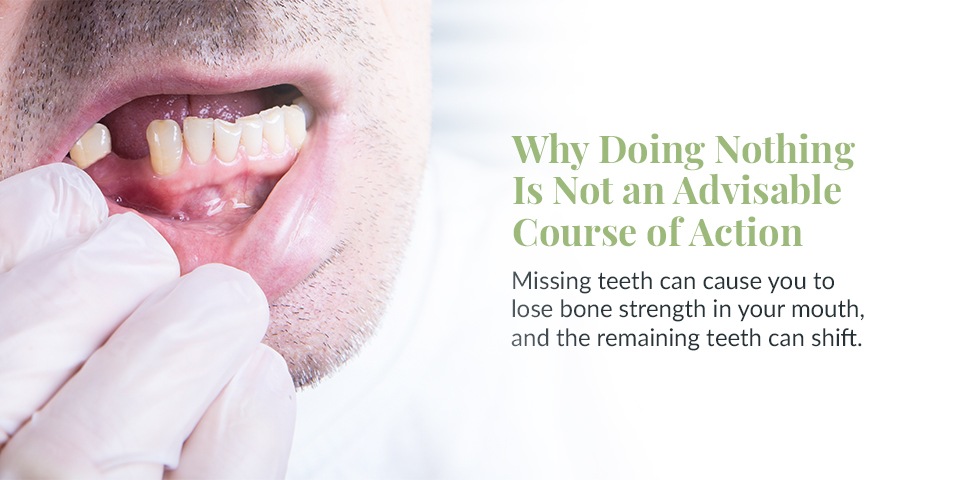
The density of your jawbone decreases after a natural tooth is gone because it no longer has root stimulation. Replacing a missing tooth as soon as possible means you will be less likely to need a bone graft procedure. Although you might not always be able to have missing teeth replaced right away, you should do your best to replace them as soon as you can.
Schedule a Consultation With 209 NYC Dental For Tooth Replacement
As a multi-specialty dental office, we can provide patients the best treatment option to improve their dental health while fitting their budget. 209 NYC Dental offers options to replace one missing tooth to an entire mouth of teeth, including dental implants, implant-supported dentures, implant crown and bridges, partial dentures and complete dentures. Deciding which tooth replacement option is the best for you involves weighing the benefits and disadvantages and learning which treatment will best address your concerns and dental health issues.
Contact 209 NYC Dental online to schedule an initial consultation or give us a call at 212-355-2290 to go over your options and have your questions answered so you can make an informed decision on replacing your missing teeth. We are the oldest continuing dental practice in the state of New York, and we take our reputation and legacy of treating generations of families with responsibility. We invest in advancing our education and clinical skills to continue providing the best dental care to our patients. Call us at 212-355-2290 today.
Author: Dr. Ben Ifraimov
 Our History
Our History
 Our Providers
Our Providers
 About Us
About Us
 Blog
Blog
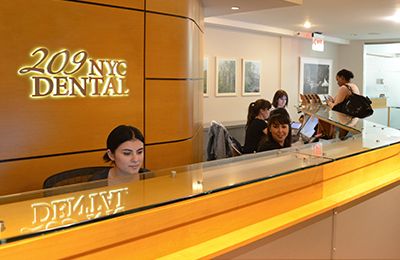 Contact us
Contact us
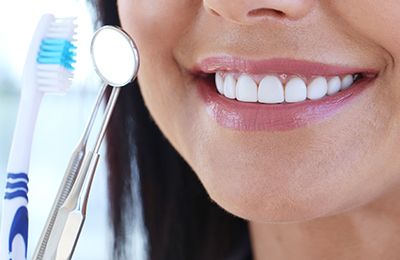 Diagnostic & Preventive
Diagnostic & Preventive
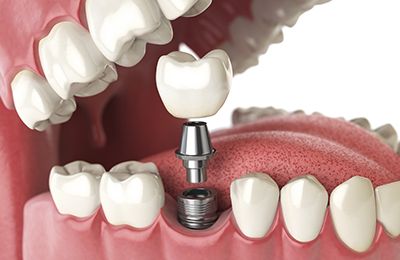 Implant Dentistry
Implant Dentistry
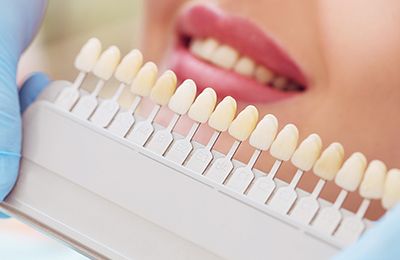 Cosmetic Dentistry
Cosmetic Dentistry
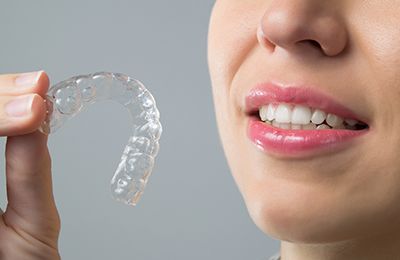 Clear Braces
Clear Braces
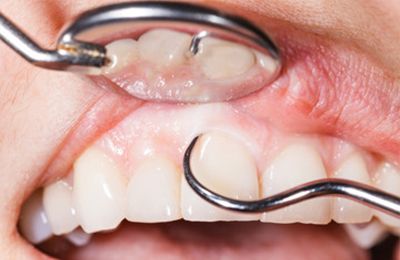 Periodontics
Periodontics
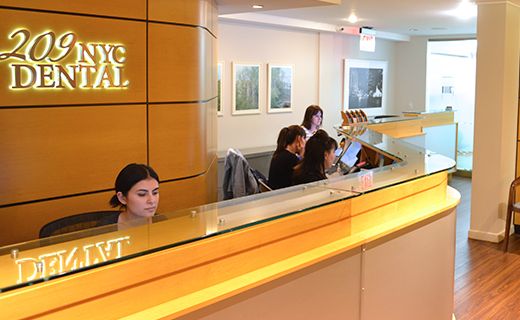 Patient Forms
Patient Forms
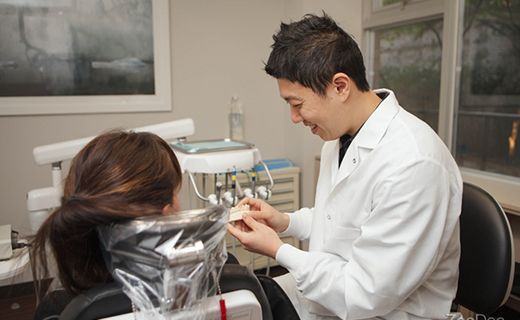 Payment Information
Payment Information
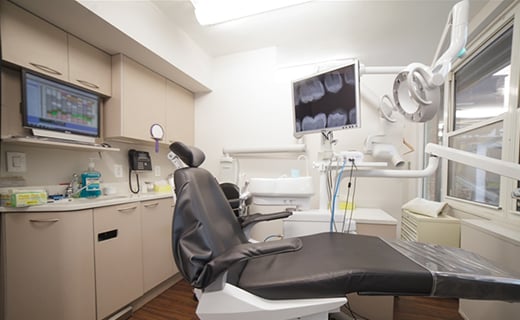 Insurance Options
Insurance Options
 CareCredit Dental
CareCredit Dental
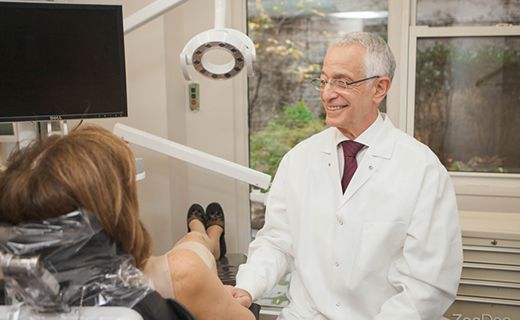 Appointment Policy
Appointment Policy
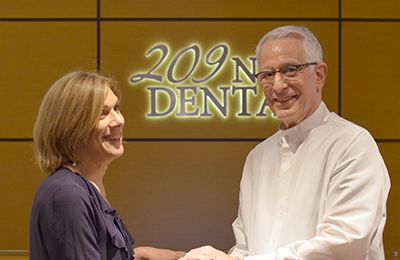 Free Consultation
Free Consultation
 Complimentary Teeth Whitening
Complimentary Teeth Whitening
 Teeth Whitening
Teeth Whitening

